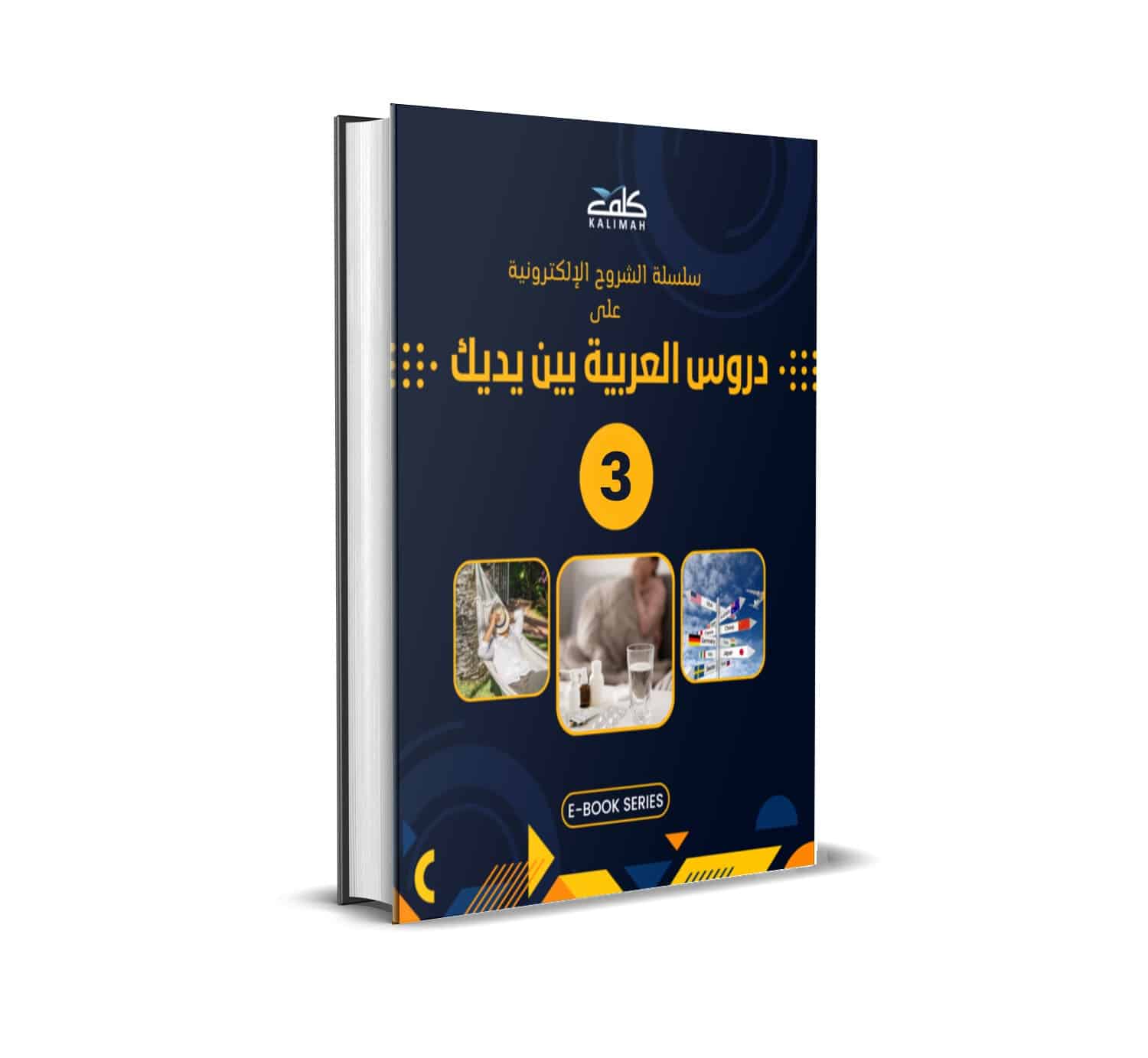Whenever you make an effort to learn new Arabic words, it’s possible that previously memorized words will be quickly forgotten. Even after further study, you might still find yourself using the same words in your writing and speech.
Why does this happen? How can you build your Arabic Vocabulary using a method that works based on discipline and effort?
1- Use Flash Cards as a Memorization Technique
Flash cards have always been the ideal tool for memorization and learning new information. In the past, they were cardboard cards with an illustration or explanation of the new word you needed to learn.
Digital flashcards are now available! They aid in making sure you have all the information you require to store every bit of information in your memory and connect it to the proper neural connections.
It’s possible to include Arabic text, audio pronunciation, and illustration pictures. Also, it’s better to translate into Arabic so that your eyes and brain become accustomed to seeing these letters.
They are also a great way to stimulate your photographic memory while keeping your language and expressions strong. Eventually, you can make your own flashcards using a variety of apps, including Quizlet.
2- Apply the Mind Palace Technique
If you do not know how to use Arabic words, learning them could be pointless. Connect newly learned words to specific contexts, groups, or conversations, so you can recall them quickly.
Events can become your personal mind palace, which is a palace with locations rather than rooms. Try to create scenes in your head using locations you have been to several times and adding the new vocabulary you have learned to them. You can set up scenes at bus stops, train stations, colleges, offices, homes, and other locations.
You can craft contextual sentences by visualizing scenes, ensuring that vocabulary aligns seamlessly with the intended setting.
This way, each word finds its rightful spot, easily retrievable from your mental ‘Mind Palace’.
Read more about how to improve your Arabic writing skills
3- Craft Personalized Phrases
You have a few words in your native tongue that you use exclusively when speaking or writing. When learning difficult Arabic words that your mind cannot retain, try this method. Include them in each appropriate sentence, so they can be fully understood.
The same Arabic word could have many uses in different sentences. In order to help you remember the word practically, try to use it whenever you can.
Just as with many languages, Arabic is rich with idioms. Learning idioms by heart may also open your eyes to a new meaning for a commonly used term.
Additionally, you can build sentences with synonyms and antonyms so that, in the event that you forget the word, the antonym or synonym will serve as a reminder.
4- Immerse Yourself in Reading
Consistent reading can be a goldmine for discovering new Arabic words. If your schedule prevents you from completing this task at the required rate, you can choose a specific time each week to complete it.
For intermediates, newspapers and magazines are invaluable reading resources. Advanced learners can dig into literature or explore books on intriguing subjects to bolster their vocabulary.
Children’s books, short stories, and bilingual materials could be a good learning resource, even for adults. Even a brief 280-character tweet can be a treasure trove of new Arabic vocabulary. Dive into diverse Twitter feeds, from news outlets to businesses, for linguistic gems.
By doing so, you are transferred to the most sophisticated learning resources, which are blogs and articles written in a more complex form of Arabic.
5- Harness the Power of Onomatopoeia
In Arabic, onomatopoeia often resonates beautifully. Simply hearing a word allows you to infer its meaning from the way it sounds. A word like “Kata’ قطع” which in English means “cut” sounds like something has been torn away from another whole, dividing the original unit into two.
Another word like “انكسر” sounds like something dropped off your hand and broke into pieces. The sound of letters will always help you easily comprehend the
read more about what is Arabic numbers and how to learn them
6- Leverage Cognates
Words with similar meanings may be pronounced very similarly across many languages. To deal with some words, many languages with Latin roots Latinized many Arabic words, and vice versa.
Take “Kutun قَطَنُ” which is Arabic for cotton; they both affect the ear in the same way. This helps you memorize Arabic vocabulary definitions without getting them mixed up.
7- Emphasize Repetition
Make a schedule for repeating difficult-to-remember Arabic words. This might occur twice per week. Then, group these words, perhaps in sets of ten, based on common themes or categories for better retention.
The repetition technique includes correct native speaker pronunciation, writing, and listening to the words.
8- Revise Previously Memorized Words
Transferring newly learned words from short-term memory to long-term memory is the primary goal of memorization. It’s essential to use every word and identify those that require some pressure so that the new words are not memorized by erasing the old ones.
When planning your revision schedule, do not forget to include both new and old words!
9- Determine the Root and Link It to the Word
The root system, which is a system that serves as the origin of any Arabic verb, is essential to the Arabic language.
This tri-lettered structure unveils a word’s lineage, enabling the formation of verbs, objects, or subject nouns. It is one of the practical methods used to teach students how to remember Arabic words.
| Root Word | Verb (Past Tense) | Active Participle (As Subject) | Passive Participle(Object) |
| KTB / ك ت ب | Kataba كَتَبَ | Katebon كاتِبٌ | Maktoob مكْتوب |
| Meaning | He Wrote | He who writes | Written |
Numerous Arabic language concepts that you should be familiar with can be shortened by understanding the root system. With this method, Arabic becomes like clay or slime that you can create based on the context in which you will use a word.
Thus, if you are familiar with the origins of a group of words, you can easily determine the meaning of any new word that shares the same root.
10- Tune into Arabic Podcasts
Podcasts have emerged as a popular information source that aids people in learning more about their interests and gaining new experiences.
In particular, by listening to serious programs that illustrate topics in technology, health, politics, religion, etc., you can use podcasts to learn new vocabulary from native speakers.
11- Watch Movies and TV Shows
You can watch documentaries in Arabic about recent scientific advancements, historical true events, or any other subject you have already seen in your native tongue.
For beginners, using subtitles while watching movies on YouTube or other streaming services is effective. Using echoic memory, just like podcasts, and movies can help you increase your vocabulary in Arabic.
12- Enjoy Educational Games
Why don’t you try solving word puzzles that require Arabic vocabulary? The crossword puzzle, in general, is a fun game that tests a variety of knowledge in a condensed space, which typically takes the shape of a square or rectangular grid.
To improve your Arabic language skills and maintain a sharp memory, you can play Arabic Alphabet games online.
13- Learn the Word of the Day
Discover an Arabic proverb to learn each morning. It might be a piece of advice that not only teaches you new words but also explains the culture and morals that Arabs uphold.
This quote can be found online, or you can simply search social media platforms to find a ton of pages that publish this kind of written content.
14- Language Exchange Sites Could be Exciting
Online conversations with strangers might seem strange at first, but if the right conditions exist, they might be possible. Actually, it’s one of the tips that help you expand your Arabic vocabulary.
Find native speakers of the Arab language who want to learn your language using one of the many language exchange websites available.
It’s a genuine opportunity that allows you to meet new people, tutor those who wish to learn your language, and actually practice Arabic.
15- Understand the Context
By using this method, you can read and comprehend without having to know the meaning of every word.
You can understand the entire message by understanding 60–70% of it. Since this is only used for reading, it will be a little challenging to memorize a word based solely on what you deduced from the context.
To adopt this strategy, make sure you revisit these materials by using a highlighter and a textbook. Also, write down what the context says about the word that you have not been able to decipher.
16- Use an Arabic Dictionary
Setting aside time to study an Arabic dictionary could be demanding. Nevertheless, whether you are learning Modern Standard Arabic or one of its dialects, an Arabic dictionary will be helpful.
In addition to teaching you how to read and write Arabic, a dictionary will also teach you how to pronounce it correctly.
All the methods we have covered in this guide will help you develop your mental muscle, make it easier to recognize Arabic letters and make listening to Arabic words less difficult. Try your favourite technique, or try them all, and let us know which one yields the best results in a comment.
🌟 Unlock Your Potential in Arabic with Kalimah Center! 🌟
Ready to deepen your connection with the Quran and enhance your understanding of Arabic? Join Kalimah Center today and embark on a transformative journey of learning and growth! Our professional, handpicked Online Arabic and Quran Tutors are dedicated to helping you master these essential skills with ease and expertise.
📚 Explore Our Courses:
Online Arabic Course: Tailored to your level, our comprehensive Arabic program includes 16 teaching levels and 400+ hours of personalized sessions.
Online Arabic Course For Kids: Nurture your child’s love for Arabic with our engaging and structured program, available in 24 levels for primary, intermediate, and secondary stages.
💡 Why Choose Kalimah?
Expert Tutors: Learn from native Arabic speakers and Ijazah-certified teachers who prioritize your progress.
Flexible Learning: Enjoy one-on-one classes, 24/7 access to materials, and interactive exercises for a dynamic learning experience.
Comfortable Environment: Benefit from a supportive and encouraging atmosphere, where mistakes are seen as opportunities for growth.
Proven Success: With over 8,000 students worldwide and glowing testimonials, Kalimah Center is your trusted partner in Arabic and Quran education.
🚀 Start Your Free Trial Today! 🚀
Don’t miss out on this life-changing opportunity to deepen your faith and knowledge. Sign up now for your free trial and take the first step towards becoming a better practicing Muslim with Kalimah Center!
FAQ
How much vocabulary is enough for Arabic?
If you know 1000 Arabic words, you can interpret about 85.5% and if you know about 2000-3000 you know about 90-95% of the language.
Does Arabic have a rich vocabulary?
Arabic has over 12 million distinct words. So, the answer is yes, the Arabic language has a rich and varied vocabulary.
How can I memorize Arabic words easily?
Using flashcards is a technique that allows you to memorize Arabic easily.













